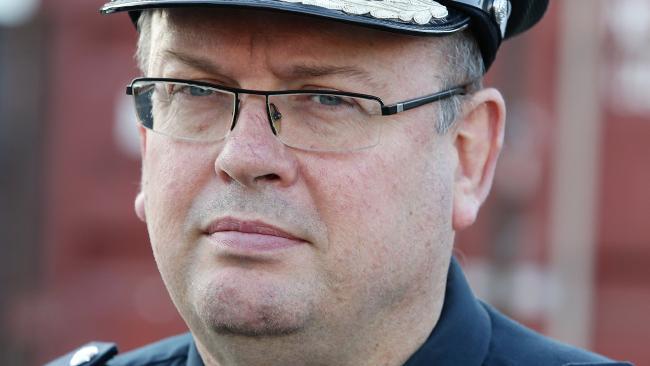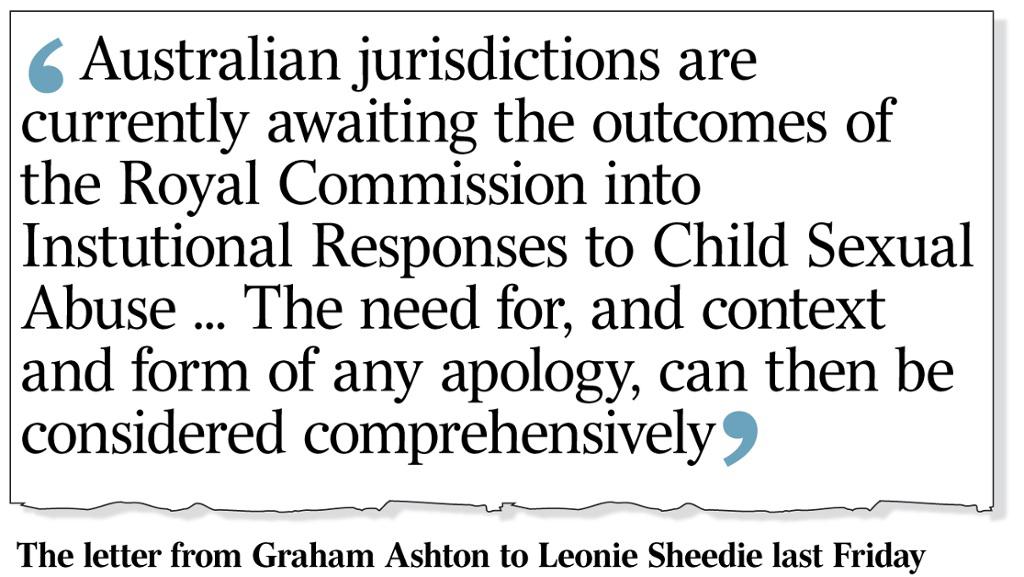|
Police chiefs planning to apologise to child-sex abuse victims
By Dan Box
The nation’s police commissioners are set to make a historic apology to the victims of child-sex abuse in institutional care who were not believed when they reported these crimes or, worse, were returned to their abusers. The true number of such abuse victims will never be known as records were not kept, have since been lost or were destroyed. That such an apology is being considered at this level shows both its extent and the damage done are feared to be significant. More than half a million children are estimated to have spent time in an orphanage, home or foster care over the past century. They represent more than 40 per cent of the 6349 people who have given evidence in private to the child abuse royal commission to date saying they were abused. In a letter sent last week and seen by The Australian, Victoria Police Chief Commissioner Graham Ashton says the Australian and New Zealand Police Commissioners Forum met recently to discuss a potential apology to those affected. Writing to the Care Leavers Australasia Network, which represents people who were in institutional care and has campaigned on the issue for several years, Mr Ashton says the other police commissioners “asked me to convey their sincere empathy about the concerns … raised”. The commissioners intend to wait until the royal commission’s final report is published in December, after which “the need for, and context and form of any apology, can then be considered comprehensively”, the letter said. “The key issue is that children, when they tried to run away, they tried to tell the police and the police returned them straight back into the hands of the abusers and nobody asked any questions,” said Leonie Sheedie, executive officer of CLAN. Children living in orphanages and other care homes across Australia were for decades treated as “second-rate citizens”, Ms Sheedie said. Many suffered often horrific levels of physical and sexual abuse, the Royal Commission into Institutional Responses to Child Sexual Abuse has found. An apology would “mean that it’s on the record,” Ms Sheedie said, “that the police failed in their duty of care to the most vulnerable people in the state”. Seventy-year-old Roy Janetzki said he ran away from Saint Augustine’s Orphanage in Geelong, Victoria, after being sexually abused at the age of 13. After trying to steal a car, he was arrested and tried to tell the police officer that “they do terrible things to boys up there at that orphanage”. This report was not investigated, Mr Janetzki said, and he was beaten by police, sent to court for the car theft and subsequently committed to another institution, where he was sexually abused again. An apology would represent a public acknowledgment that “it did happen, and we finally do believe you”, Mr Janetzki said. “A lot of kids who did escape were just grabbed and taken back and there was no paperwork and they were just taken back to the same sexual abuse. “Everything needs to be brought out into the open,” Mr Janetzki said. “It would be good for all the other kids. They went through the same thing and we tried and we tried and no one believes you and we just gave up.” The Australian and New Zealand Police Commissioners Forum, which includes the leaders of each state, territory and federal police force, met to discuss the possible apology in Melbourne in October last year. Officers from the royal commission, which has so far referred 1775 matters to police nationwide for investigation, also attended the meeting to discuss their work. Mr Ashton, who proposed discussion of the apology at the meeting, told The Australian “we were sympathetic to the issues raised and we intend to finalise discussions … on this once the royal commission has finalised its report”. The commission, which has held 49 public inquiries around Australia since it was established in January 2013, is due to submit its final report and recommendations to the Governor-General, Sir Peter Cosgrove, no later than December 15. In his letter, Mr Ashton writes that “the need for, and context and form of any apology, can then be considered comprehensively”. “Our decision to await the outcomes of the (royal commission) does not diminish our view that the issues raised by CLAN are of significant concern,” his letter says. The commission’s next public hearing, into the Catholic Church, will begin next month.
|
.
Any original material on these pages is copyright © BishopAccountability.org 2004. Reproduce freely with attribution.

